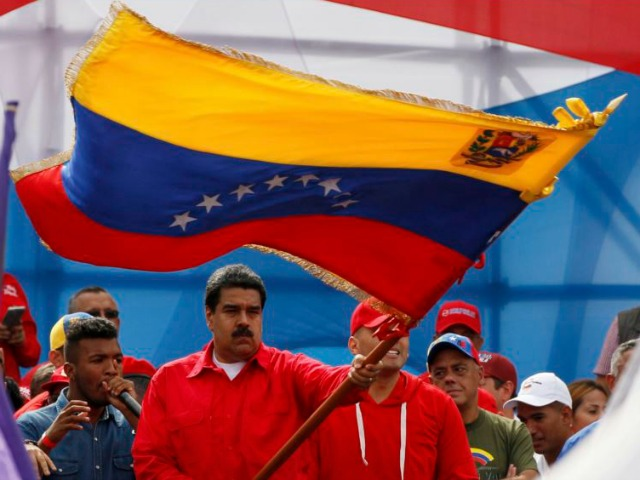Venezuelan dictator Nicolás Maduro accused the country’s private television networks of running a “terrorist campaign” against the government in the run-up to Sunday’s sham election.
“I demand a public explanation from the owners of Venevisión and Televen. Are they committed to the Constitution and Democracy, or will we have to take severe measures against you?” Maduro said in front of an audience of supporters.
“In every national election, they run a special operation for election coverage. It helps to promote democracy and voting. Yet [Sunday] was an exception,” he continued.
Maduro’s comments follow Sunday’s election in Venezuela, designed to consolidate his authority through the creation of a parallel legislature referred to as a “constituent assembly,” designed to usurp the power of lawmakers and rewrite the country’s constitution. Maduro claimed that the networks in question did not adequately promote the election, widely condemned internationally as a step towards institutionalizing his dictatorship and thus served to benefit the “terrorist” opposition.
On Sunday evening, Maduro claimed victory, hailing the poll as “the biggest vote the Bolivarian revolution has ever had in all 18-year electoral history,” arguing that the result would bring “reconciliation and peace” to the crisis-stricken country. However, according to opposition leaders, turnout for the election was just 15 percent, while Maduro and government officials claimed it was 41.5 percent, approximately eight million people.
Furthermore, the day was marred by extreme violence as over a dozen people were killed, while police arrested 96 people during widespread demonstrations.
Maduro also alleged that the networks had covered roads with barricades, preventing “two to three million” people from voting, and coordinated with the “right” in order to promote violence. He then compared it to the “media oligarchy that overthrew Commander Chávez for 48 hours (in April 2002).”
“I will not allow a coup d’état, nor conspiracies,” he added.
In 2002, television networks overwhelmingly opposed to Hugo Chávez’s leadership provided continuous coverage of a coup d’état attempt on his government, which critics argued enabled the coup and promoted violence.
As a result, freedom of the press became stifled as Chávez sought to cement his authority. By 2009, at least 34 private radio stations had been shut down, while he had repeatedly tried to pull the opposition television station Globovisión off the air through intimidation of its employees.
Meanwhile, state-run television channel VTV is known for its pro-government propaganda, regularly failing to report the scale of protests and anti-government opposition, blaming demonstrations on a conspiracy from the “fascist right,” and window-dressing figures pertaining to Venezuela’s dire economic predicament.
Backing up this specific Maduro’s allegation, VTV points to article 27 of the Law on Social Responsibility for Radio, Television, and Electronic Communications, stating networks cannot be apologists for crimes or foment public outrage.
It has also become known for some of its bizarre coverage, which includes its flagship show, Sundays with Maduro, where the president has regularly danced on live television.
In June, snipers and armored tanks were placed around the channel’s headquarters in Caracas, as student groups and opposition leaders demanded fairer coverage and an end to its brazenly pro-government stance.
You can follow Ben Kew on Facebook, on Twitter at @ben_kew, or email him at bkew@breitbart.com

COMMENTS
Please let us know if you're having issues with commenting.